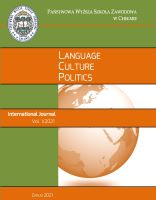Immigrants Descent and its Expression in American Culture and Language in the 20th Century
Immigrants Descent and its Expression in American Culture and Language in the 20th Century
Author(s): Rafał ZygmuntSubject(s): Language and Literature Studies
Published by: Instytut Neofilologii, Państwowa Wyższa Szkoła Zawodowa w Chełmie
Keywords: Tzvetan Todorov; Thomas and Znaniecki; Old World; New World; immigrant; identity; new culture; émigré; Vladimir Nabokov; translation; memories; Eva Hoffman; Alfred Kazin
Summary/Abstract: It is undoubtable that the immigration to the US is largely due to the steady flow of fresh minds and a new spirit that influences the development of the American society. These new forces help protect the American society from the stagnation experienced in the Old World. The importance of immigrant experiences puts the United States on the brink of a very difficult, but often successful combination of the new and the old. Beyond question, this is true, especially regarding twentieth-century emigrants such as Eva Hoffman or the family of Alfred Kazin. Although Vladimir Nabokov having been himself an exception, not easy to categorize as writer, in his life as an émigré in the USA, he could also prove that the absorption of the American culture and language to a large extent took place, and was fruitful. For much of the twentieth century, the immigrant osmosis of the New World was associated with assimilation to the highly desirable, largely monolithic, English culture of the East Coast.
Journal: Language, Culture, Politics. International Journal
- Issue Year: 1/2022
- Issue No: 7
- Page Range: 169-180
- Page Count: 12
- Language: English

